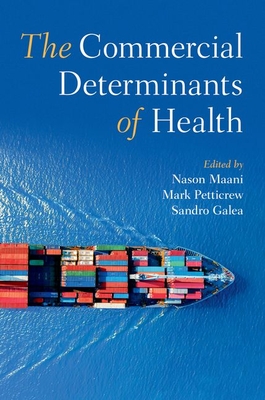图书简介
This pioneering volume illustrates the profound intersectional impact of commercial actors on our sociocultural and physical environments and the necessity for cross-disciplinary communication and collaboration on these critical health issues.
Section 1: Why Commercial Determinants?; Chapter 1: Commercial Determinants of Health: An Introduction; Nason Maani, Mark Petticrew, and Sandro Galea; Chapter 2: A Systems Perspective on the Pathways of Influence between CDOH and Health; Cecile Knai and Natalie Savona; Chapter 3: Global Health and Equity Burden of Commercial Determinants of Health; Julia Anaf, Fran Baum, and Matt Fisher; Section 2: How Do Commercial Determinants Shape Upstream Drivers of Health?; Chapter 4: The Role of Policy in Studying the Commercial Determinants of Health; Benjamin Hawkins; Chapter 5: Understanding the Politics of the Commercial Determinants of Health; Eduardo J. Gomez; Chapter 6: The Role of Commercial Influences in Public Understanding of Harms, Causes and Solutions; Mark Petticrew, Nason Maani, and May van Schalkwyk; Chapter 7: The Role of Corporations in Influencing Culture; Nancy Tomes; Chapter 8: Industry Influence on Science: What Is Happening and What Can Be Done; Alice Fabbri and Anna Gilmore; Chapter 9: Role in Trade Deals and Investment; Pepita Barlow and Eric Crosbie; Section 3: Case Studies by Industry; Chapter 10: Hidden from View: Alcohol Industry Efforts to Keep the Epidemic of Alcohol-Related Harm from Public Awareness; Tim Stockwell and Erin Hobin; Chapter 11: Learning from 70 Years of Tobacco Control: Winning the War and Not Just the Battles; Anna B. Gilmore and Sarah Dance; Chapter 12: The Fossil Fuel Industry: Fuelling Doubt and Navigating Contradiction; May van Schalkwyk, Nason Maani, and Mark Petticrew; Chapter 13: The Gambling Industry: Harmful Products, Predatory Practices and the Politics of Knowledge; May van Schalkwyk and Rebecca Cassidy; Chapter 14: Sugar-Sweetened Beverages; Eric Crosbie, Laura Schmidt, Jim Krieger, and Marion Nestle; Section 4: Cross-Industry Mechanisms; Chapter 15: Marketing; Simone Pettigrew and Alexandra Jones; Chapter 16: Corporate Social Responsibility: Past, Present, and Future; Nino Paichadze, Vinu Ilakkuvan, Muluken Gizaw, and Adnan A. Hyder; Chapter 17: The Institutionalization of Corporate Power within Policy; Gary Fooks; Chapter 18: Corporations as Irresponsible Artificial People: Human Rights, Profits, and Public Health; George J. Annas; Chapter 19: Industry Influence on Research: A Cycle of Bias; Lisa Bero; Chapter 20: The Global Technology Sector as a Commercial Determinant of Health; Nora Kenworthy, Katerini Tagmatarchi Storeng, and Marco Zenone; Section 5: Advancing Science and Scholarship; Chapter 21: Defining the Commercial Determinants of Health; Jennifer Lacy-Nichols, Cassandra de Lacy-Vawdon, and Rob Moodie; Chapter 22: Assessing Power Structures; Joana Madureira Lima; Chapter 23: Rethinking Conflict of Interest: From Individual to Structural Understandings; Jeff Collin, Rob Ralston, and Sarah Hill; Chapter 24: Assessing the Health Impacts of the Commercial Determinants of Health; Luke N. Allen; Chapter 25: Assessing the Economic Impacts of Corporations; Martin McKee; Chapter 26: Prioritizing Research on the Foundational Drivers of Corporate Policy Influence; William H. Wiist; Chapter 27: The Influence of Commercial Industries on Public Discourse; Shona Hilton; Chapter 28: Commercial Determinants of Health in Low- and Middle-Income Countries; Salma M. Abdalla, Leona Ofei, Nason Maani, and Sandro Galea; Section 6: A Way Forward; Chapter 29: The Question of Industry Partnerships; Peter J. Adams; Chapter 30: Understanding and Managing Corporate Conflicts of Interest; Katherine Cullerton and Martin White; Chapter 31: Teaching the Commercial Determinants of Health; Nicholas Freudenberg and Eric Crosbie; Chapter 32: Learning from Experience: Identifying Key Intervention Points around Corporate Practices to Improve Health; Melissa Mialon, Julia Anaf, and Fran Baum; Chapter 33: A Policy Agenda for the Commercial Determinants of Health; Sally Casswell; Chapter 34: Commercial Determinants of Health: A Research and Translational Agenda; Nason Maani, Mark Petticrew, and Sandro Galea; ; Index $ MBNH; JPA; KCQ; KNXC $ Personal
Trade Policy 买家须知
- 关于产品:
- ● 正版保障:本网站隶属于中国国际图书贸易集团公司,确保所有图书都是100%正版。
- ● 环保纸张:进口图书大多使用的都是环保轻型张,颜色偏黄,重量比较轻。
- ● 毛边版:即书翻页的地方,故意做成了参差不齐的样子,一般为精装版,更具收藏价值。
关于退换货:- 由于预订产品的特殊性,采购订单正式发订后,买方不得无故取消全部或部分产品的订购。
- 由于进口图书的特殊性,发生以下情况的,请直接拒收货物,由快递返回:
- ● 外包装破损/发错货/少发货/图书外观破损/图书配件不全(例如:光盘等)
并请在工作日通过电话400-008-1110联系我们。
- 签收后,如发生以下情况,请在签收后的5个工作日内联系客服办理退换货:
- ● 缺页/错页/错印/脱线
关于发货时间:- 一般情况下:
- ●【现货】 下单后48小时内由北京(库房)发出快递。
- ●【预订】【预售】下单后国外发货,到货时间预计5-8周左右,店铺默认中通快递,如需顺丰快递邮费到付。
- ● 需要开具发票的客户,发货时间可能在上述基础上再延后1-2个工作日(紧急发票需求,请联系010-68433105/3213);
- ● 如遇其他特殊原因,对发货时间有影响的,我们会第一时间在网站公告,敬请留意。
关于到货时间:- 由于进口图书入境入库后,都是委托第三方快递发货,所以我们只能保证在规定时间内发出,但无法为您保证确切的到货时间。
- ● 主要城市一般2-4天
- ● 偏远地区一般4-7天
关于接听咨询电话的时间:- 010-68433105/3213正常接听咨询电话的时间为:周一至周五上午8:30~下午5:00,周六、日及法定节假日休息,将无法接听来电,敬请谅解。
- 其它时间您也可以通过邮件联系我们:customer@readgo.cn,工作日会优先处理。
关于快递:- ● 已付款订单:主要由中通、宅急送负责派送,订单进度查询请拨打010-68433105/3213。
本书暂无推荐
本书暂无推荐














